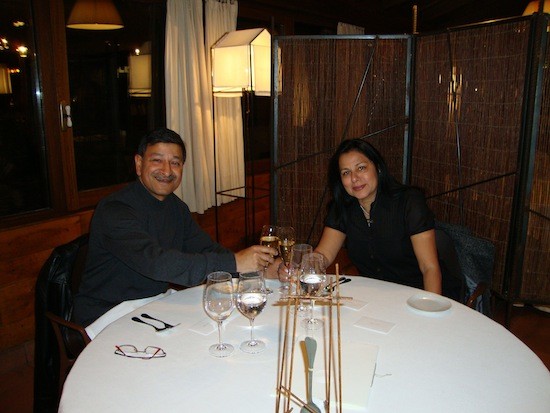
Every Monday, Clay Oven Irvine executive chef-owner Geeta Bansal shares an interview that she's done with some of the heavyweights of European cooking. Today, she regales us with a visit to Mugaritz in Spain and its fabulous chef, Andoni Aduriz. Enjoy!
I have always believed that memories of food you taste on your travels are the best souvenirs of a trip, easy to pack and transport. I know this because I revisit my cache of such memories many times. Mugaritz and Chef Andoni Luis Aduriz figure very prominently in my reminisces of San Sebastian and the gastronomy of Spain.
]
San Sebastian, located in the Basque area of Spain close to the border
with France, has become the gastronomic capital of the world. The
countryside around San Sebastian area is hauntingly beautiful, with
verdant green hills, views of the Bay of Biscay, and the Urmea river
almost dividing the city into two parts. There is the old town with
numerous pinxto (“tapas” in Euskadi, the Basque language) bars and then
there are the fabulous restaurants at the pinnacle of haute cuisine.
Chef Aduriz's Michelin-starred restaurant, Mugaritz (rated #3 by
Restaurant Magazine in 2012) is in Errenteria, Gipuzkoa, outside of San
Sebastian. Set amongst the picturesque countryside, at the end of a long
winding road, is a farmhouse-like structure standing in isolation,
surrounded by greenery. The first time we drove there at night, we got
lost in the hills; the second time we took a taxi and the taxi driver
got lost. Now thankfully any navigation system will lead you there in 20
minutes or so from the center of San Sebastian.
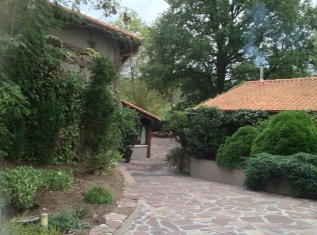
If you have a choice, you should visit Mugaritz in the daytime to be
able to enjoy the serene setting, and later during your meal be able to
understand the connection between the terroir and the cuisine. The food
at Mugaritz is representative of local produce, traditions, seasons and
the enormous respect Chef Aduriz has for the gifts of nature. His style
of cooking is sometimes referred to as neo-naturalism. He changes the
properties of foods while preserving the form or sometimes transforms
them completely by an advanced scientific process. His food at times is
like an intellectual dialogue between the chef and the diner. He plays
with your mind and emotions, resulting in a dining experience beyond the
food. The menus are constantly changing based on the seasons and on
what the research team has created.

If anything, food is the culture of a certain time or place encapsulated
and presented on a plate or a menu. Aduriz exemplifies this concept
brilliantly, as he presents the Basque culinary traditions in a modern
format, re-imagined and representative of here and now. He is a
dignified, intellectual chef, part food researcher, part philosopher (a
very young 42 year philosopher!). I am enraptured by any conversation or
contact with him. He is one of these individuals that cross your path
in life and leaves an indelible impression on you that transforms you in
a positive manner.
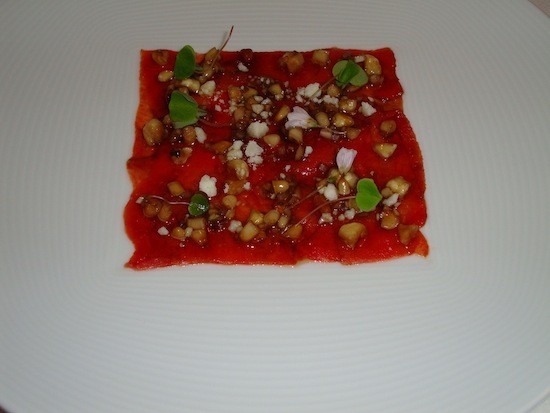
After my first visit and the unforgettable watermelon carpaccio (the
last time at his luncheon for the Gastronomika, I did have the vegetable
carpaccio which, though brilliant, did not trump the watermelon
masterpiece) I have been back for more of these experiences. You enter
this large farmhouse-like structure and emerge into a very clean,
contemporary, yet traditional dining room with wrought iron screens and
the silverware resting on pottery shards. It is very soothing and
serene, just like the service, the food, and the chef in the kitchen
leading his brigade. His dishes are about texture, technique,
creativity, and imagination. Prepare yourself for the unexpected, as on a
previous visit we were offered two choices for our meal: Either we
submitted to a superlative experience, or we rebelled (or thought we
wanted to).
On my last visit the team at Mugaritz was into Papel “Kraft”. The diners
are presented with an envelope containing a sheet of edible paper made
of flax and wheat! The complicated process of transformation one of the
many developed by the R&D team upstairs.
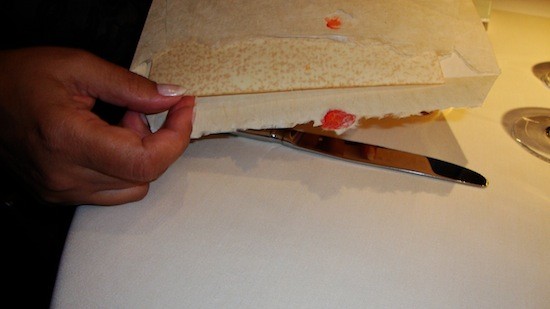
This time I went back to the kitchen for the first time since a
devastating fire destroyed it in 2010. During this visit to the kitchen,
Aduriz offered me a taste of what would be presented at the
Gastronomika in a few days: a macaron which looked like a perfect
chocolate macaron from Ladurée. At the first bite (knowing Chef Andoni's
sense of whimsy) I knew that I tasted foie (in fact it was partridge
and duck liver), but there was another slightly metallic taste that I
could not place. The smiles on their faces told me that it was something
I would not eat otherwise (At Mugaritz you even enjoy tasting what you
know you do not like to eat).
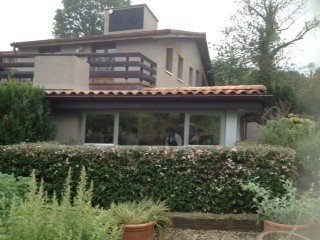
The macaron de Caza was served the following week at the Gastronomika
along with a short film featuring a primitive huntress who eventually
ended up in the Mugaritz dining room, macaron in hand after a hunt
through the forest. The mystery was revealed the following week: The
albumen from egg white in the macarons had been replaced with fresh pigs
blood, which has the same properties.
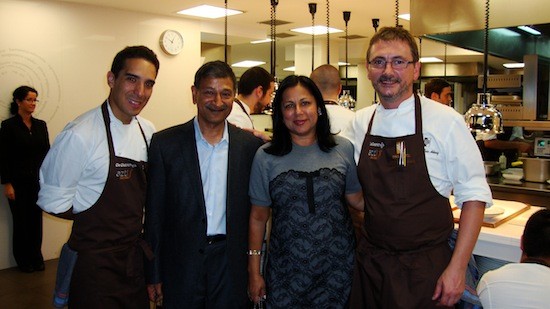
Aduriz has also dabbled in the world of art, theatre, and music in the form of a collaborative music project and a play titled The Degustation de Titus Andronicus.
The research aspect and the scientific approach, both elements he
absorbed at his time at El Bulli, are nevertheless entirely his own
interpretations at Mugaritz. The R&D facility on the floor above the
restaurant carries out research that sometimes appears as offerings on
the restaurant menu. Their FoodSprays are now available on the market in
Spain after being presented at the Madrid Fusion conference this
January. At this event, Chef Aduriz demonstrated a dish with baked
Jerusalem artichokes that mimicked exactly the crabmeat that he served
them with on the plate. The Jerusalem artichokes were marinated in a
solution of lime (calcium hydroxide) to form a kind of outer coating
which preserved the vegetable's texture during the cooking process. The
dish was representative of a nouvel cooking style referred to as neo-
naturalism, when natural ingredients are transformed by a complicated
scientific process so that they retain their organic texture and shape
and mimic another ingredient with perfection.
I presented numerous questions to him during our meeting, which he took
the time to absorb and give very thoughtful responses to. If it is
possible, I feel even more impressed with Chef Aduriz's intellect and
his grasp of important issues in the world of cuisine. His social
consciousness separates him from a lot of chefs in the world,AND I feel
fortunate to have been able to have this interaction with him.
And now, the questions…
What is your philosophy about food?
Given the fact that there are many fine restaurants in the world where
people have the choice to eat and create memories, we search to expand
the boundaries of the known, create unique moments, and stimulate
creative outlook. All this from a quest for excellence and respect for
the environment and culture.
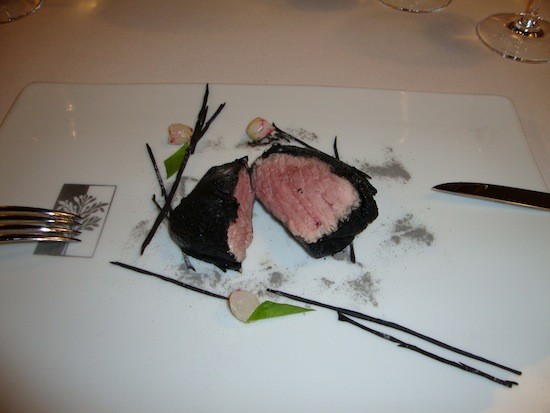
What do you not appreciate about restaurant menus?
I believe that if people do not do things better it is because they are
ignorant or incapable. I am very tolerant and understanding generally. I
believe that restaurants should communicate better what we offer and
thus avoid many frustrating episodes. One of the things that bother me
the most is when they kidnap time, when the meal is endless.
Is the present fiscal crisis in Spain and the rest of the world
affecting the operations of fine dining?
When consulting with professionals who have been in the hospitality
business for many decades about the impact of the current crisis, they
say that they had never experienced anything like this. Before, when
there was a crisis in a sector or country, there was another covering
the vacancies…but right now, the situation affects all sectors and a
large number of countries, creating a new and difficult situation. We
cannot complain, because we work a lot (Mugaritz reservations are not
easy to come by), but obviously we have noticed that national customers
don't come as often, and of course, a contraction in domestic
consumption is visible.
You choose to highlight a lot of local ingredients in your cuisine? What is the most important reason for doing that?
In Mugaritz, we think that customers do not pay only for our cuisine,
they pay for more…they pay for us to search for, explore and introduce
them to new recipes and ideas. Also to select to and for them the finest
ingredients…so, if we understand that about a vast majority of gourmets
who visit us from around the world, it is logical that we make an extra
effort to make sure our environment is represented on our dishes.
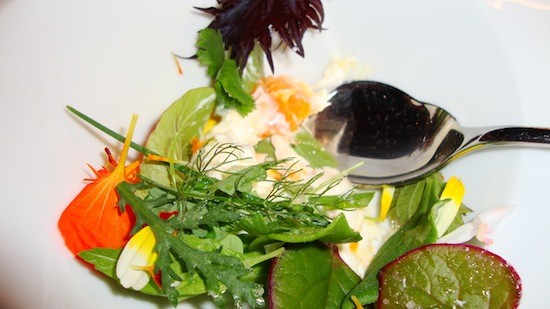
There is a lot of interactive process in your menu where the diners
interact with the presentation. Why do you want to engage your diners in
this way?
When we are moved, we connect with our most transcendent part. Visit a
place like Mugaritz, it is something that you cannot do every day, so
when it happens, it should be a special and unique experience. If we
want people remember this experience for a long time, it has to dial
into our emotional memory. We do not want people who visit us that are
just observing dinners, we try to have active accomplices in our dining
room.
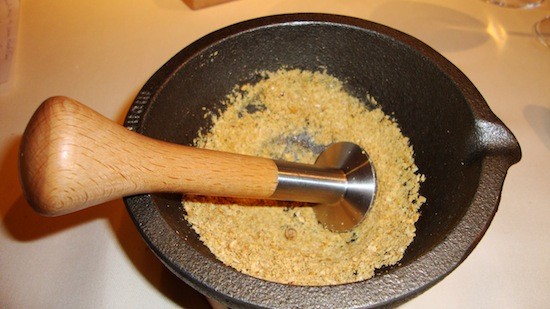
What do you think about chefs who offer your creations on their menus without giving you due credit?
I think as professionals we do all that we can. I think if someone does
not do the right thing it is because he does not know better or has no
opportunity to do so. (I ask this question of chefs because I have
during my dining experiences have begun to classify plates by the names
of chefs who created a particular style or mix of ingredients lately.
Rene Redzepi, Albert Adria, Thomas Keller, and Massimo Bottura come to
mind)
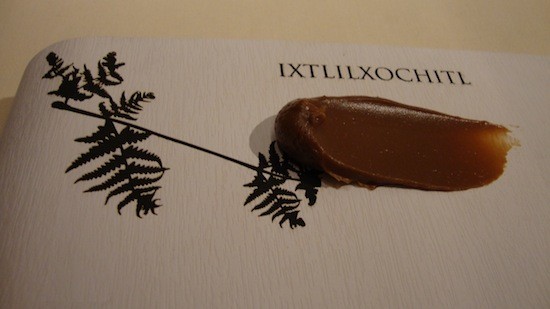
You have visited the United States many times, which is your favorite
city?
I have lived great experiences in many cities of United States: Chicago,
Boston, New Orleans… But if I have to choose, I would pick New York.
When is your next planned visit to the US?
Probably I will be in California next April participating in a event. I
have many friends in the U.S. and it is tremendously inspiring visit
them. (The introduction to his book Mugaritz: A Natural Science of Cooking
has been written by Thomas Keller, of Per Se and French Laundry fame,
and by Ferran Adria of the now closed El Bulli. Aduriz was part of the
conceptual team of El Bulli for two years before establishing his own
restaurant.)
What are your views regarding collaborations with chefs who cook other
cuisines?
I am not referring to fusion but actual collaborations where
the presentations have items from each cuisine.
I have the good fortune to have travelled widely and met many many chefs
worldwide. All chefs are more adept at some things than others so, when
I have the opportunity of being in front of someone who has something
to teach me, I become a curious apprentice. I like to learn, try to
understand and interact.
Is there a particular cuisine that you would like to learn more about?
Honestly, I would like to know everything. I have the good fortune to
meet many cooks in the world and when something catches my attention, I
have no problem asking a thousand times.
(I heard a story recently about a food event in France. Rene Redzepi of
Noma restaurant in Copenhagen was demonstrating a technique for some
kind of soup and Chef Aduriz was taking copious notes. To Aduriz
surprise, Redzepi announced at the end of the demonstation that this
particular technique was in fact inspired by Chef Aduriz.)
What is the most exciting cuisine that you have encountered in your travels?
Traveling with Alex Atala (the handsome world-renowned chef behind D.O.M
restaurant in Sao Paolo) around Brazil or around Peru with Gaston
Acurio, have been two of the most adventurous experiences of my life.
Now I can say that I have eaten some of the most exotic ingredients in
the world, especially in Japan.
Which one of your peers do you respect or admire the most?
I deeply admire many colleagues. I respect the committed cook,
courageous, sincere and honest and, fortunately I know many cooks who
have these attributes.
Which female chef do you think is the most innovative?
Because of the proximity I know Elena Arzak's work better than that of
other female colleagues who are also doing a great job. Personally I
consider Elena one of the most innovative professionals I know. (Elena
Arzak, along with her father Juan Mari, heads the kitchen of Arzak,
their three-Michelin starred family restaurant. Juan Mari Arzak is known
as the father of contemporary Basque cuisine.)
Which is the most interesting food symposium you have attended in the last few years?
There are great culinary events worldwide. Perhaps those events located
in rich environmental proposals, whether kitchens or markets, are
especially remembered. It happens when you go to a meeting in Japan or
Peru, for example. An event out of the ordinary, because the
conversations about cuisine are minimum is “Diálogos de Cocina” (it is
one of the most interesting that I remember) with takes place biannually
in San Sebastian.
Do you plan to open multiple restaurants locally or overseas?
Mugaritz will celebrate its 15th anniversary this March and there has
been no year in which we have not received proposals to open other
restaurants around the world. We like to do things right and enjoy the
process. Right now our priority is to consolidate our presence in the
Hotel Abadía Retuerta Le Domaine in Valladolid. It is an idyllic place,
an oasis of beauty and tranquillity.
Being one of the leading food personalities in the culinary world, do
you feel a sense of responsibility regarding the direction that food
will take in the future?
In some ways, I would say yes because the future is built by all of us
in the present so, our actions are crucial. I hate to be alarmist but it
is vital to understand that the rate at the world is advancing can lead
to a barren landscape, speaking about culinary landscape, if we do not
protect cultural and biological ecosystems. It is very sad to see how
information technologies have advanced so much in a few years and we are
not able to eradicate world hunger.
Would like your family members to follow you into the culinary world?
Not particularly. I try that my family live in a quality gastronomic
environment, understanding that the cuisine and food is an important
part of our cultural and emotional landscape, and this is directly
related to health and wellness. If my son internalizes this, I will feel
satisfied.
What would be your ideal vacation?
Quiet, in a calm place with my family where I can go unnoticed, where no one knows me.
What is your comfort food?
A good selection of cheese, good bread and wine.
What is your favorite meal that you like to cook for your family and friends?
It depends on the season of the year or where we are but I will say that
I usually cook: peas “tear”, hake in green sauce, rice with fish or
clams, squid in its ink, marmitako, tuna with tomato, peppers “cristal”
roast etc. (I want to be at one these meals, Chef Aduriz please note!)
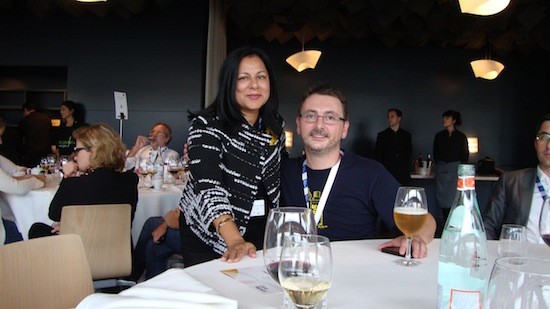
After a wonderful lunch he hosted at the end of the Gastronomika at the
Kursaal restaurant Nineo, I said goodbye to this brilliant intellectual
chef, looking forward to seeing him in a few months in California.

